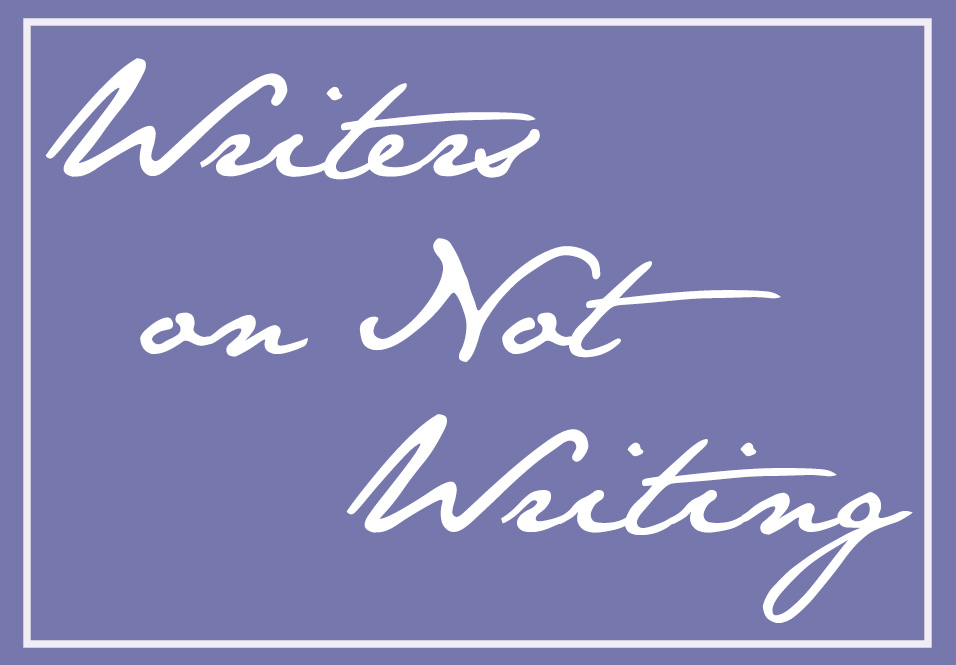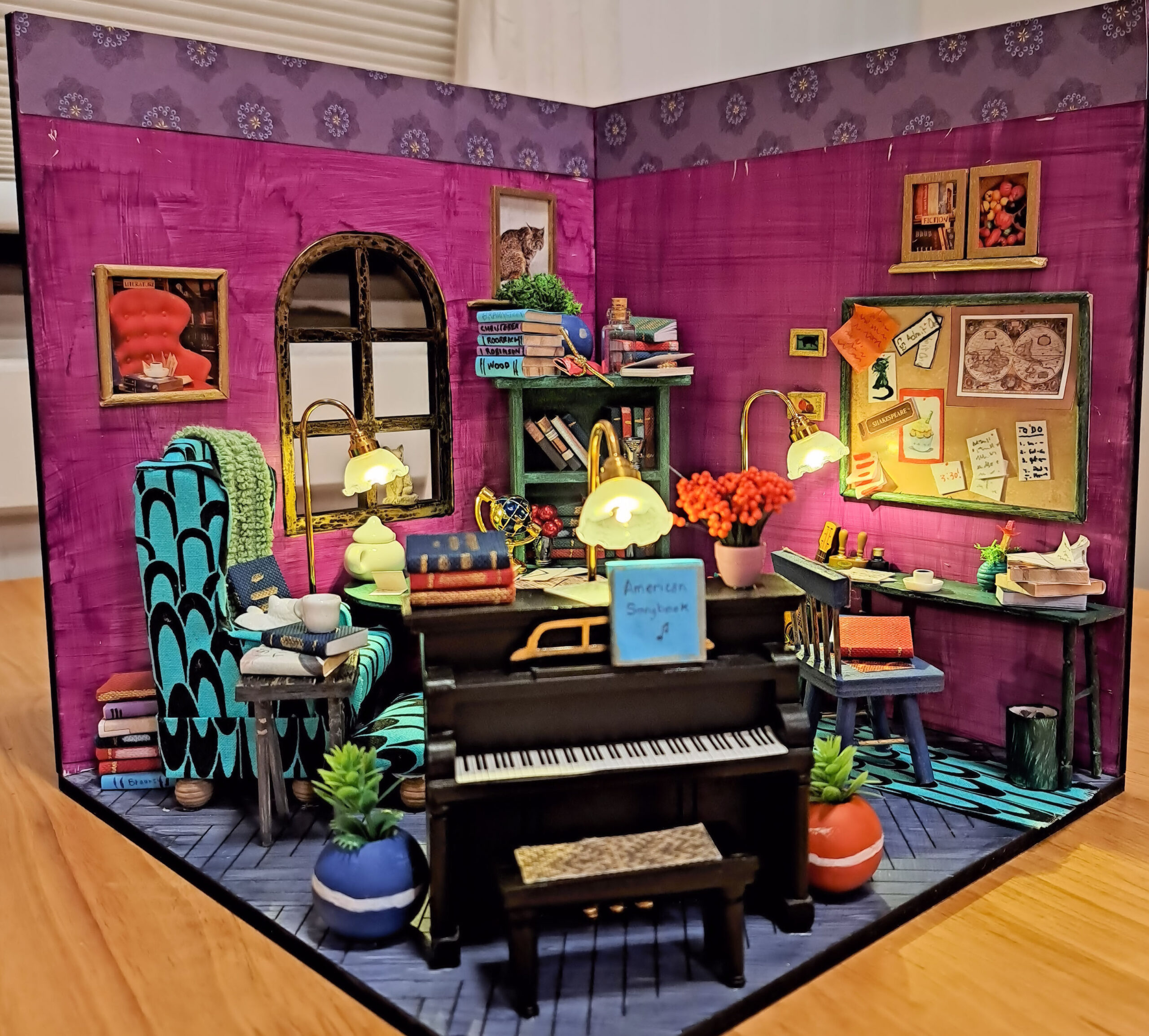Writers pour so much energy into their craft that sometimes we forget that creative pursuits other than writing can fill us up in other important ways. Here, we’ll look at what writers do when they aren’t writing, and how those pursuits affect the return to the page. This month, we hear from two writers—Aaron Hamburger and Monica Wood—on how baking and miniature-making keep them grounded.

When I’m not writing, I like to play tennis and cook and/or bake. These two activities have several things in common. They require great concentration, which is a great way to clear my head after spending hours trying to imagine a character in an orange grove in 1952 for example. They also involve a combination of structure and creativity, much like creative writing. To bake a cake that rises successfully or to hit a forehand that has both power and shape, you have to observe certain principles, think about the ingredients and measure them precisely (for the cake), think about the movement and position of your body, your fingers and swing (for the forehand). Similarly, a sentence must be precise, and it must be shaped, and it must be intentional. Only then, with those basic elements in place and correct, can you find true creative freedom. Once I know how to make a cake rise, I can flavor it and decorate it any way that I want. Once I know how to hit a forehand properly, I can decide where I want to hit it and even more importantly, why. It’s the same with writing. Once I understand the logic of how a sentence is put together, the difference between dependent and independent clauses and how they work on the brain, the difference between simple and compound sentences, the use of modifiers and phrases, and so on and so on, I then have an array of tools I can choose from to achieve certain effects on the page. Readers may not notice these choices consciously, but hopefully all will feel and experience the emotions I’m attempting to convey through those choices as they read my stories.
One key difference between playing tennis and baking versus writing is that not everyone plays tennis or bakes, and so people appreciate those activities as specialized skills. However, everyone has written down words, whether on paper or on a screen, to compose shopping lists or social media posts or birthday cards. And so there are people who suppose that the same intuitive process that works to compose those things is the same process that will work to compose a short story or a novel. In fact, that kind of mindframe just might work out once or twice, but not over the long haul of a writing career.
The other thing that tennis in particular has taught me is this: Wed yourself to the process, not the results. I used to play every point as if my life depended on it, and based on the outcome, win or lose, I would judge not only my ability at tennis but also my self-worth. That’s not what the pros do, or at least the pros worth emulating. A pro understands that when you’re playing tennis, you have a strategy that you’re trying to execute, a shot you want to perfect, and pursuing that strategy, whether you actually succeed at executing or not, is the success in itself. I’ve published four books, and so far I have not won the Pulitzer Prize. But in the writing of each one, I’ve experienced what Lily Briscoe says in To the Lighthouse: I have had my vision. And that is a wonderful thing to have.
Aaron Hamburger
 Lately I’ve been building miniature rooms, sort of like a doll house for adults. I started with a miniature-bookstore kit I got for Christmas, then thought: Why don’t I just make one from scratch? So I did, and fell into the deepest, weirdest rabbit hole. I’d never set foot in a craft store before two months ago, and now I have a frequent-flyer card. It’s totally nuts. I’m not going to conventions or anything, but I do spend a lot of time watching YouTube videos of people who are very good at this. I start with a “room shell” that’s about 7” square, with two walls. Then I paint and furnish it. If it’s a home study/library, I make many dozens of tiny books, little tables and shelves, stuffed chairs, mini frames for mini pictures. It’s unbelievably gratifying, takes hours and hours and HOURS, and I feel ten years old the whole time I’m working on one. For a painter friend’s birthday I made a mini art studio with easels and canvases, and coffee cups all over, and tiny pencils, pens, brushes (my cat is missing a little clip of fur; thank you, Susie), and a tiny apron slung over a tiny chair. This all sounds like madness, and it is. I don’t know what’s come over me. I work with wood, paper, clay (baked in my kitchen oven), wire, paint, and zillions of toothpicks.
Lately I’ve been building miniature rooms, sort of like a doll house for adults. I started with a miniature-bookstore kit I got for Christmas, then thought: Why don’t I just make one from scratch? So I did, and fell into the deepest, weirdest rabbit hole. I’d never set foot in a craft store before two months ago, and now I have a frequent-flyer card. It’s totally nuts. I’m not going to conventions or anything, but I do spend a lot of time watching YouTube videos of people who are very good at this. I start with a “room shell” that’s about 7” square, with two walls. Then I paint and furnish it. If it’s a home study/library, I make many dozens of tiny books, little tables and shelves, stuffed chairs, mini frames for mini pictures. It’s unbelievably gratifying, takes hours and hours and HOURS, and I feel ten years old the whole time I’m working on one. For a painter friend’s birthday I made a mini art studio with easels and canvases, and coffee cups all over, and tiny pencils, pens, brushes (my cat is missing a little clip of fur; thank you, Susie), and a tiny apron slung over a tiny chair. This all sounds like madness, and it is. I don’t know what’s come over me. I work with wood, paper, clay (baked in my kitchen oven), wire, paint, and zillions of toothpicks.
I do have other pursuits, but this one has overtaken me for now. What I love about it most is how much like writing it is: I’m building little worlds, following my imagination. But in this case, I get a sure thing at the end, much faster.
I haven’t yet returned to the page. I might be lost forever.
Monica Wood
Aaron Hamburger is the author of a story collection titled THE VIEW FROM STALIN’S HEAD which was awarded the Rome Prize by the American Academy of Arts and Letters and three novels: FAITH FOR BEGINNERS, nominated for a Lambda Literary Award, NIRVANA IS HERE, winner of a Bronze Medal from the 2019 Foreword Reviews Indies Book Awards, and HOTEL CUBA. In 2023, he was awarded by Lambda Literary with the Jim Duggins, PhD Outstanding Mid-Career Novelist Prize.
His writing has appeared in The New York Times, The Washington Post, The Chicago Tribune, Tin House, Poets & Writers, Tablet, O, the Oprah Magazine, and many others. He has also won fellowships from Yaddo, Djerassi, the Civitella Ranieri Foundation, the DC Commission on the Arts and Humanities, and the Edward F. Albee Foundation. He has taught creative writing at Columbia University, the George Washington University, New York University, Brooklyn College, and the Stonecoast MFA Program.
Monica Wood is a novelist, memoirist, and playwright; the 2024 recipient of the Sarah Josepha Hale Award for excellence in the arts in New England; the 2019 Constance Carlson Prize for contributions to the public humanities in Maine; and the 2018 Maine Writers and Publishers Alliance Distinguished Achievement Award for her contributions to the literary arts. Her newest novel, How to Read a Book, has already secured translation rights in five countries. Her previous novel, the bestselling The One-in-a-Million Boy, was translated into 20 languages in over 30 countries. She is also the author of When We Were the Kennedys, a New England bestseller and winner of the May Sarton Memoir Award. Her other fiction, Any Bitter Thing, Ernie’s Ark, and My Only Story, have also won awards and made bestseller lists. Her short stories have been widely anthologized and featured on Public Radio International. Her nonfiction and reviews have appeared in O, the New York Times, Literary Hub, Down East, the San Francisco Chronicle, Martha Stewart Living, Parade, and many other publications. She is also the author of several books for aspiring writers and three plays, Papermaker, The Half-Light, and Saint Dad. She lives in Portland with her husband, Dan Abbott, and their cat, Susie.
Curated by Jen Dupree
